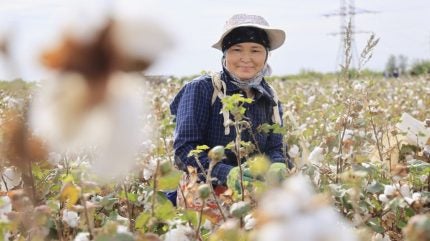
The Better Cotton programme has amplified the verification of licensed clusters within Uzbekistan by empowering independent civil society groups and third-party auditors, alongside the adoption of an improved due diligence methodology.
Cotton clusters in Uzbekistan refers to vertically integrated private enterprises that receive land allocations under the stipulation that they use this land for cotton cultivation and processing.

Discover B2B Marketing That Performs
Combine business intelligence and editorial excellence to reach engaged professionals across 36 leading media platforms.
Better Cotton Uzbekistan programme head Katerina Gorbunova said: “In collaboration with our programme partner, the German Agency for International Cooperation (GIZ), we have strengthened the programme’s framework and the services we offer to accelerate change across the country’s cotton sector.”
The revamped approach includes comprehensive interviews and questionnaires targeting both cluster management and workers, said Better Cotton.
It also scrutinises financial stability, ethical practices, and governance structures to provide a more holistic assessment of risks and performance among participating entities. Insights from this process are instrumental in shaping specific interventions.
Following Better Cotton’s transition into a certification scheme, it has introduced preliminary assessments for new clusters before the growing season to gauge their certification readiness.

US Tariffs are shifting - will you react or anticipate?
Don’t let policy changes catch you off guard. Stay proactive with real-time data and expert analysis.
By GlobalDataIf clusters fail to meet the criteria, their audits are deferred to the subsequent season, noted the organisation.
For clusters that hold active licenses, Better Cotton staff conduct second-party checks to uncover potential issues related to decent work.
When necessary, these findings can prompt further investigation by external labour rights monitors, the group added.
Uzbekistan is the world’s sixth largest producer of cotton, according to Better Cotton.
“The Uzbek cotton sector has tremendous potential to be a leader in the production of more sustainably produced cotton. This can only be achieved through collaboration, robust and transparent processes, and perseverance,” Gorbunova added.
Better Cotton and GIZ have been broadening their training programmes since August last year to include regenerative agricultural techniques, social sustainability and principles of decent work in response to recent amendments in Uzbek labour legislation.
The training employs a method aimed at educating cotton cluster management who then pass on their knowledge to workers, creating a ripple effect of peer support.
GIZ Uzbekistan cotton project manager Paul Schumacher said: “Today, sustainable agricultural methods, trade facilitations and decent work are no longer parallel efforts, they are parts of one sustainable system. With the right networks and shared effort, as we created within the frame of Better Cotton, we turn individual action into systemic change.”





